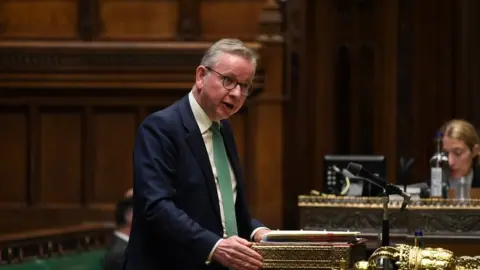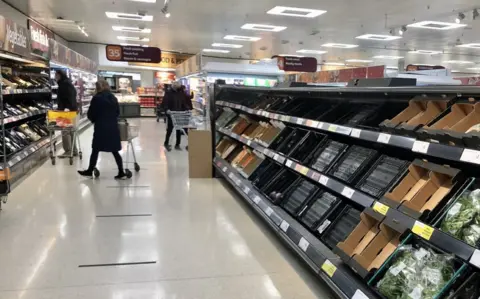Brexit: Michael Gove calls for extension of Brexit grace periods
 UK Parliament
UK ParliamentCabinet Office Minister Michael Gove has called for grace periods to be extended, to allow businesses more time to adapt to new Irish Sea border processes.
The EU's usual rules on customs and product standards are not yet being fully enforced at NI ports.
The first of the grace periods agreed by the UK and EU is set to expire at the end of March.
NI Secretary Brandon Lewis previously said he did not expect any extensions.
But speaking on Tuesday in the House of Commons, Mr Gove said there were "serious problems" with the NI Protocol that needed to be addressed.
Issues 'not teething problems'
Since 1 January, Northern Ireland has remained in the EU single market for goods while the rest of the UK left, meaning checks have to be carried out on some goods entering NI from Great Britain.
The NI protocol sets out how these systems should operate, but it has been criticised by unionist parties who argue that it has damaged trade and poses a risk to the union.
Mr Gove told MPs there were significant issues with the NI Protocol needing to be addressed.
Prime Minister Boris Johnson previously played down concerns about the protocol and called them "teething problems", but Mr Gove said he would not describe them this way.
"We do need to make sure grace periods are extended so that supermarkets can continue to provide consumers with goods they need," he said.
The minister said he would write to the EU with "specific proposals", and confirmed a meeting would take place with Stormont's first and deputy first ministers, Arlene Foster and Michelle O'Neill, on Wednesday along his with EU counterpart European Commission Vice-President Maros Sefcovic.
What are the grace periods?
There are a number of grace periods currently in operation including for food products, as well as commercial parcels arriving in NI from the rest of the UK.
The grace period for food means that some businesses, particularly major retailers, do not need to comply with all the EU's usual certification requirements when importing products from the rest of the UK.
 PA Media
PA MediaThe EU has strict rules on products of animal origin: meat, milk, fish and eggs.
These products must usually be accompanied by an Export Health Certificate (EHC), a document signed by a vet or other qualified person.
However, authorised businesses will not need an EHC for most products until April.
Supermarkets have already warned that the system will become unworkable if the grace period expires without a long-term solution.
'Damage done' over vaccine row
Mr Gove's call to extend grace periods came as he also warned that trust has been "eroded" between the UK and EU after Brussels sought to trigger an emergency provision in the Brexit deal to control Covid vaccine exports.
He said none of the conditions for deploying Article 16 in the NI Protocol had been met.
The EU reversed the decision, which could have seen Irish border checks.
Mr Gove said "urgent action" was needed to resolve growing community tensions in Northern Ireland.
On Monday, it emerged Brexit inspection staff had been withdrawn at two ports in NI over security fears.
Mr Gove said he recognised the EU's move had provoked anger and concern in Northern Ireland, as well as international condemnation.
"Article 16 exists for a good reason - it is only meant to be invoked after all other options are exhausted and in the interests of people of Northern Ireland - none of these conditions were met," he added.
But he said he believed there was goodwill from the EU and that it would work with the British government to resolve outstanding issues.
Shadow NI Secretary Louise Haigh described the EU's planned move as a "serious mistake" but urged against politicians using the row to try and undo the protocol altogether.
Why are parties divided over the NI Protocol?
The protocol, which is part of the Brexit Withdrawal Agreement, is designed to allow the free movement of goods from the EU into NI, and prevent the need for a hard border on the island of Ireland.
Unionist parties oppose it, arguing it poses a risk to the stability of the union by placing a border down the Irish Sea.
They have been pressing the UK government to use Article 16 to reduce checks on goods entering Northern Ireland from the rest of the UK.
So far the government has been resisting this, insisting the new arrangements can be resolved through further discussions with the EU.
Anti-Brexit parties in Northern Ireland say, in the absence of another solution, the protocol must be fully implemented but they have urged the EU and British government to provide greater flexibility for businesses to adapt to the new systems.
What is Article 16?
Article 16 is essentially a safeguard within the protocol that would allow the UK or EU to act unilaterally if measures imposed as a result of the protocol are deemed to be causing "serious economic, societal or environmental difficulties".
It has been regarded as an emergency brake to be used only if issues with the protocol cannot be resolved first through the UK-EU joint committee.
The EU intended to trigger it on Friday to control the export of coronavirus vaccines into NI - but later reversed the move after a backlash from politicians at Stormont, London and Dublin.
